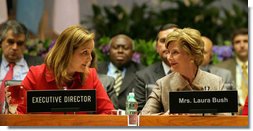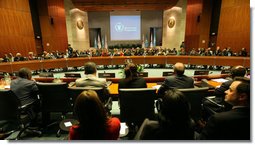|
Home >
News & Policies >
June 2008
|
For Immediate Release
Office of the First Lady
June 12, 2008
Mrs. Bush's Remarks to the World Food Program Executive Board
World Food Program Headquarters
Rome, Italy
2:10 P.M. (Local)
MRS. BUSH: Thank you very much, Mr. President. Thank you, Josette. Thank you very much for asking me here. And I want to thank everybody on the World Food Program Board for everything you do.
This is the first time I've visited this building, the World Food Program building, but it's not the first time I've been briefed about all the work you do. Every time I've been to Rome I've asked for a briefing from some people in the World Food Program. I've been with Sheila a couple of times, and others, just for a briefing of what you do. And, of course, I've been briefed by my own daughters -- by Barbara, who has loved her work that she's been able to do with the World Food Program; by Jenna, who worked with UNICEF in Central America; and by my niece, Lauren. I don't think Lauren has been mentioned, but she's the one who has the FEED bag that so many Americans are carrying around now that is a benefit for the World Food Program.
 Mr. President, thank you very much. Thank you for the work you do as
President of the Board, and thank you for asking me here. And I also want
to recognize the Ambassador from the United States, Gaddi Vasquez. Thank
you very much for what you do as well.
Mr. President, thank you very much. Thank you for the work you do as
President of the Board, and thank you for asking me here. And I also want
to recognize the Ambassador from the United States, Gaddi Vasquez. Thank
you very much for what you do as well.
The United States is proud to work with the World Food Program and your mission to feed the hungry and to help the hungry feed themselves.
Today, as all nations face a significant increase in global food prices, higher costs can mean the difference between a daily meal and no food at all for millions of people across the globe.
Last month President Bush called on the United States Congress to provide an additional $770 million to support U.S. food aid and development programs. In addition, the administration authorized an estimated $200 million in emergency food aid in April.
These two actions bring the U.S. response to rising food prices to nearly $1 billion in new funds that will further ongoing U.S. efforts. And we project that the United States will spend at least $5 billion to fight global hunger over the next two years.
As the United States increases its food assistance, we must also change the way it's delivered. Increasing commodity and freight costs are making it more difficult to provide life-saving emergency food aid. President Bush has called on Congress to support a proposal to purchase up to 25 percent of U.S. food assistance directly from farmers in the developing world. This measure would help build local agriculture, and by reducing shipping delays and costs, it would help us get more food to those in need faster. I urge the United States Congress to approve this as soon as possible.
The benefits of U.S. assistance can be seen in nations like Afghanistan. After a hard winter and years of drought, more than 5 million Afghan men and women live each day with food uncertainty. This morning I addressed the International Conference in Support of Afghanistan, and as we speak right now, members of the international community are reaffirming their support for this nation as it recovers from decades of war and oppression. Food assistance is critical to these efforts.
 The U.S. has already contributed to filling Afghanistan's emergency
shortfall with more than 160,000 tons of wheat, worth over $150 million,
over the last two years, with 30,000 tons going in just the last two
months. And with the new funding the President announced last month, we'll
provide additional resources worth over $22 million for the World Food
Program's work in Afghanistan.
The U.S. has already contributed to filling Afghanistan's emergency
shortfall with more than 160,000 tons of wheat, worth over $150 million,
over the last two years, with 30,000 tons going in just the last two
months. And with the new funding the President announced last month, we'll
provide additional resources worth over $22 million for the World Food
Program's work in Afghanistan.
The U.S. and our international partners are working with Afghanistan's government to stimulate production of wheat and other food crops. USAID Administrator Henrietta Fore yesterday announced a new voucher program that will help make the production of critical food crops like wheat more affordable for Afghan farmers. Under this initiative, valued at up to $60 million, farmers will be able to buy seeds and fertilizer at a greatly reduced cost.
Last month, President Karzai addressed farmers in his nation with a clear message: Those who use arable land to grow poppy instead of wheat are starving their families and their neighbors. And in his address to today's International Conference in Support of Afghanistan, President Karzai highlighted agriculture as one of his nation's top priorities for future development.
The United States will continue to support Afghanistan as it recovers from the manmade disaster that left its people to build a society from nothing. In times of natural disaster, we know that timely food aid can mean the difference between life and death.
When two floods and a devastating cyclone ravaged the country of Bangladesh, the United States responded with $20 million in emergency supplies and immediate relief. We're now supporting this country as it recovers, contributing $78 million in food aid, much of which will go to the victims of the cyclone.
In Burma, the United States has committed more than $35 million in humanitarian assistance in responding to Cyclone Nargis. Of this total, $12 million will go to the World Food Program for food aid, including 1,600 tons of urgently needed commodities from a USAID warehouse in Djibouti. These will arrive in coming weeks.
Burma's ruling junta has not yet granted full access to the international community. Just last week, the U.S. Navy pulled relief ships from Burma's coastline after 15 separate requests to provide assistance were rejected. As Burma's government refuses some international assistance, many of its own people have not yet received help since the cyclone struck in May.
We urge Burma's ruling generals to allow U.S. and other international humanitarian relief teams, as well as non-governmental organizations, to provide assistance in getting supplies quickly and efficiency [sic] to areas of need. The World Food Program is playing a critical role in directing aid to those who require it most.
Thank you very, very much for your important work in Burma. And thank you for putting up with all of the challenges of working there and continuing to figure out ways to get help to the people in need.
From Afghanistan to Africa, the United States understands that meeting people's basic need for food is a global problem that demands a global response. As the world's largest donor of food assistance, we're committed to helping alleviate hunger worldwide. And we'll continue to coordinate our relief efforts with you, with all of the United Nations, with the G8, the World Bank, and other stakeholders. Together, we can share our resources to alleviate urgent need and to work toward a world where no person has to go hungry.
Thank you all very, very much for your very good work. (Applause.)
END 2:18 P.M. (Local)


